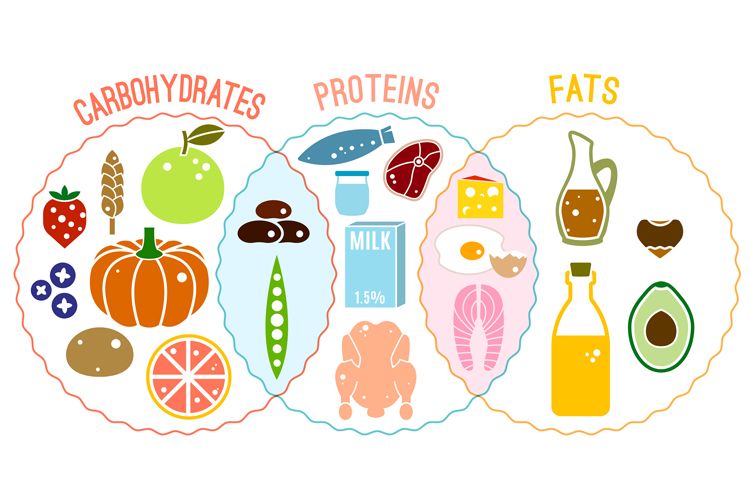
Macronutrients breakdown
Carbohydrates, Proteins & Fats. Why is it all so confusing?
If you have ever delved into a bit of nutrition research, then you were more than likely bombarded with so much information that you left feeling more confused than ever. You may have come across such headings as; ‘Carbs make you fat’, ‘Eat Carbs to shed unwanted fat’, ‘You need loads of protein for muscle gains’, ‘Too much protein is damaging to your kidneys’.
Or you may found a few of the hundreds of diets out there claiming to be the answer you have been looking for; the keto diet, low carb diet, Atkins diet, paleo diet and even the carnivore diet (where you only consume meat or other produces solely from an animal).
Don’t worry you are not alone. There is plenty of truth out there but also a lot of misinformation. Through this post I am going to clear up as much of the grey areas as I can, so you can be confident you are making healthy informed decisions regarding your nutrition. Below I will explain the 3 macronutrients (Carbohydrates (carbs), Protein & Fats), what they do and why we don’t need to cut out any of them.
Carbohydrates
The first thing you got to understand is that Carbs are NOT bad for you and them by themselves do not make you fat. Carbs are used by the body for energy. Energy to get up in the morning, energy to go to work, energy to train or energy to manage those little “angels” you have running riot around the house.
Now Carbs are not essential for survival as we can use Fat & Protein for energy, but Carbs have other benefits. Fruits & vegetables which are Carbohydrates provide us with plenty of vitamins & minerals needed to release this energy & aid digestion of food. What is more, some forms of carbohydrates are less digestible (known as fiber) and they help the digestive system.
Carbohydrates can be split into fast releasing (sugar, honey, sweets) & slow releasing (wholegrain, veg & fruit). The latter is preferred for a sustained slow release of energy throughout the day and is better for overall health. The former can be used when a burst of energy is needed for example before a tough training session, during sport competition or if you are feeling particularly lethargic and is recommended less often than the slow release carbs.
Fats
Fats ARE good for you and just like Carbs they can be split into ones we should eat more of and ones we should eat less of but unlike Carbs, Fats are essential for us. Essential fats reduce your risk of cancer, heart disease, Alzheimer’s disease and much more.
The two main forms of fat are Saturated & Unsaturated.
Saturated fat sources:
- Fatty meat
- Cured meat (salami, chorizo, bacon)
- Processed meals
- Dairy products
- Biscuits & cakes
Unsaturated fat sources:
- Olive oil
- Rapeseed oil
- Nuts and seeds (not in roasted form)
- Avocado
- Fish such a salmon, trout & mackerel.
It is recommended to consume more unsaturated fats and less saturated fats. Choose Lean non-processed meat over fatty or processed meat, fresh nuts and seeds over roasted or salted varieties, good quality oils over palm or vegetable oil and natural yogurt over other forms.
Protein
Probably the most talked about of the 3 macronutrients and sometimes you might feel as if it’s been shoved in your face that you need to get enough protein in your diet or else all hell will break loose. In fact, you are probably more likely to over than under consume protein with the amount of protein bars, drinks and protein meal packages that are out there. Don’t get me wrong you need protein, it’s essential and it’s needed for growth, repair of damaged muscles, production of hormones, enzymes and loads of other bits that make your body tick.
Its recommended that the more you train the more protein you need (up to a point). I recommend between 1.2-1.6 grams of protein per kg of body weight (70kg × 1.4 = 98 grams of protein). If you train 1-3 times a week then the lower end is fine, 3+ days and you can start to aim for the mid-higher level. If you are cutting calories to shed some unwanted fat aim for 1.6 grams. As a guide, professional athletes who sometimes train twice a day hit around 2-2.4, so unless you think you are a pro then keep it within the recommended range. One last consideration is to try and spread your intake of protein throughout the day so you have some protein for breakfast, dinner, tea and as a snack.
The best sources of protein are;
- Eggs
- Quinoa
- Lean meat
- Fish
- Soya (tofu)
- Beans & lentils
- Nuts & seeds
My last bit of advice to finish off this post is, keep it simple. Go for the healthy options (most of which you already know), don’t get too bogged down in the finer details unless you want to. Eat the foods you enjoy, don’t overindulge and keep the less healthy foods to a minimum. Don’t settle for bland meals just because you know they are healthy, there are so many good recipes out there to try.

